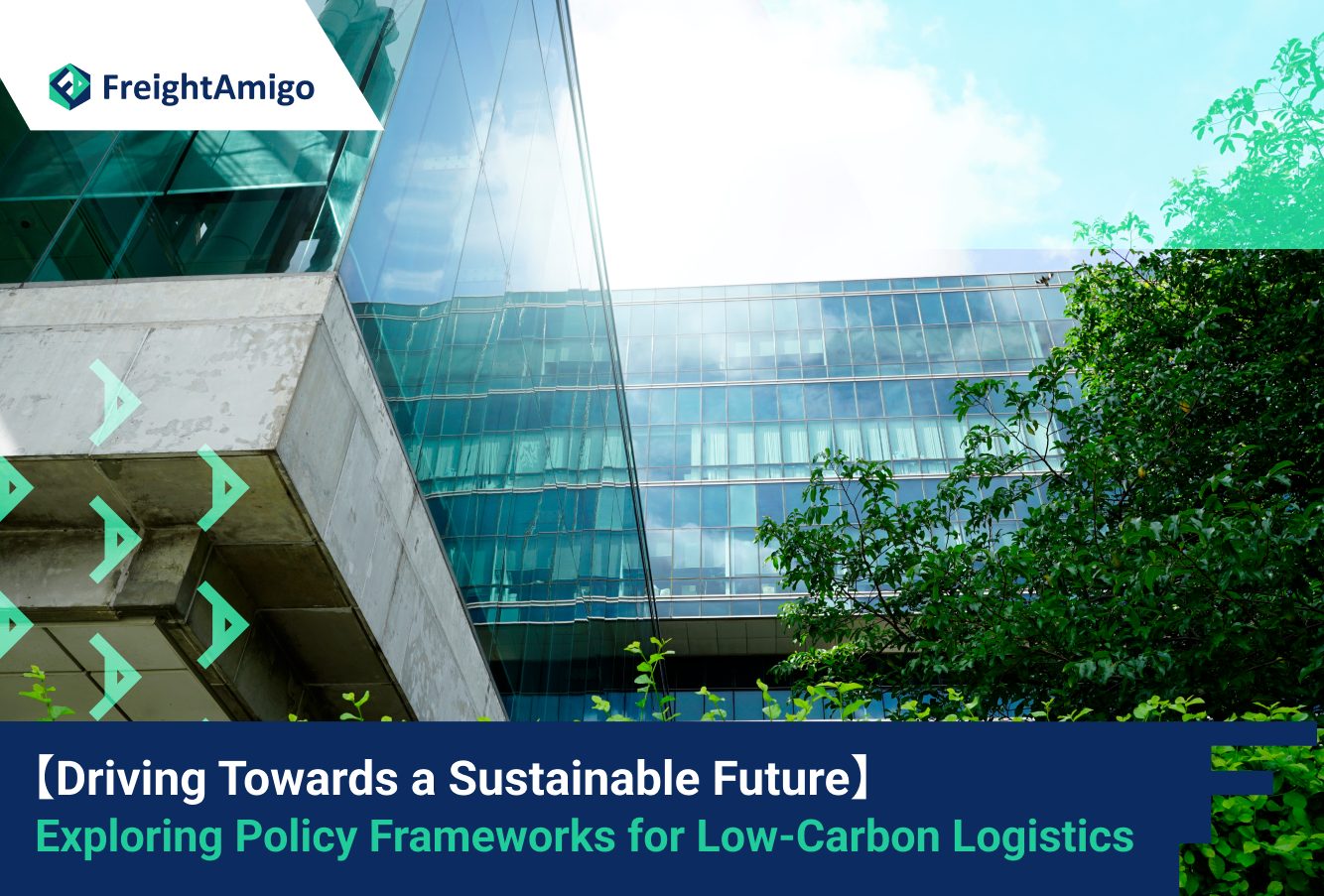Author Name: Tiffany Lee – Marketing Analyst at FreightAmigo
The logistics industry plays a crucial role in the global economy, ensuring the smooth movement of goods from manufacturers to consumers. However, this essential function also comes with a significant environmental impact, primarily through carbon emissions generated by transportation activities. In recent years, there has been a growing awareness of the need to reduce these emissions and transition towards a more sustainable future. This article delves into the world of low-carbon logistics, exploring the importance of reducing carbon emissions in the industry and examining the policy frameworks that promote sustainable practices.
Want To Compare The Best Express, Air Freight, Sea Freight, Rail Freight & Trucking Rates So As To Have Better Control On Cost?
The Importance of Reducing Carbon Emissions in the Logistics Industry
The logistics industry is a major contributor to greenhouse gas emissions, primarily due to its heavy reliance on fossil fuels for transportation. As the global demand for goods continues to increase, so does the carbon footprint of the industry. It is estimated that the logistics sector is responsible for approximately 7% of global CO2 emissions. This alarming statistic highlights the urgent need to address the environmental impact of logistics operations and find ways to reduce carbon emissions.
Reducing carbon emissions in the logistics industry is not only crucial for mitigating climate change but also for improving air quality and public health. Vehicles used for transportation emit pollutants such as nitrogen oxides and particulate matter, which have detrimental effects on human health and contribute to respiratory diseases. By adopting low-carbon logistics practices, we can create cleaner and healthier environments for both people and the planet.
Policy Frameworks for Promoting Low-Carbon Logistics
Governments and international organizations have recognized the importance of promoting low-carbon logistics and have implemented various policy frameworks to encourage sustainable practices. These frameworks aim to incentivize the adoption of greener technologies, improve energy efficiency, and reduce carbon emissions in the logistics industry.
One of the key policy frameworks is the implementation of carbon pricing mechanisms, such as carbon taxes or emissions trading schemes. These economic instruments create financial incentives for businesses to reduce their carbon emissions by making high-carbon activities more costly. By internalizing the environmental costs of carbon emissions, carbon pricing encourages companies to explore low-carbon alternatives and invest in sustainable technologies.
Another policy approach is the development of stricter emissions standards for vehicles used in the logistics industry. Governments have been setting increasingly stringent regulations on vehicle emissions, pushing manufacturers to produce more fuel-efficient and environmentally friendly vehicles. These standards promote the adoption of electric and hybrid vehicles, which have lower or zero tailpipe emissions, thereby reducing the carbon footprint of logistics operations.
International Agreements and Initiatives for Sustainable Logistics
Recognizing the global nature of the logistics industry and the need for coordinated efforts to address climate change, international agreements and initiatives have been established to promote sustainable logistics practices. One such agreement is the Paris Agreement, which aims to limit global warming to well below 2 degrees Celsius above pre-industrial levels. The agreement calls for all sectors, including logistics, to contribute to the reduction of greenhouse gas emissions.
Additionally, organizations like the International Maritime Organization (IMO) and the International Civil Aviation Organization (ICAO) have been working towards reducing emissions from shipping and aviation, respectively. These organizations develop international regulations and standards to improve the energy efficiency of vessels and aircraft and promote the use of alternative fuels.
Challenges and Barriers to Implementing Low-Carbon Logistics Policies
While there is a growing recognition of the need for low-carbon logistics, implementing sustainable policies in the industry is not without its challenges. One significant barrier is the high upfront costs associated with adopting greener technologies and infrastructure. Electric vehicles and renewable energy systems, for example, often require substantial investments that may deter some businesses from embracing these solutions.
Another challenge is the lack of standardized measurement and reporting methodologies for carbon emissions in the logistics sector. This makes it difficult to track and compare emissions across different companies and regions. To overcome this barrier, there is a need for harmonized reporting frameworks that enable accurate measurement and transparent reporting of carbon emissions.
Strategies for Overcoming Challenges and Promoting Sustainable Logistics
To overcome the challenges and promote sustainable logistics, several strategies can be employed. Financial incentives, such as grants and subsidies, can help offset the initial costs of adopting low-carbon technologies and infrastructure. Governments can also offer tax breaks or other financial rewards to businesses that demonstrate significant reductions in their carbon emissions.
Collaboration between stakeholders is another key strategy. Governments, businesses, and industry associations can work together to develop best practices, share knowledge, and pool resources. This collaborative approach fosters innovation and accelerates the transition to low-carbon logistics.
Education and awareness campaigns are also crucial to drive behavioral change and encourage sustainable practices in the logistics industry. By highlighting the benefits of low-carbon logistics, such as cost savings and improved reputation, businesses can be motivated to embrace sustainable solutions.
Conclusion: The Future of Low-Carbon Logistics and Its Impact on the Environment
As the world becomes increasingly aware of the urgent need to address climate change, the logistics industry must play its part in reducing carbon emissions. Policy frameworks, international agreements, and collaborative efforts are crucial for promoting low-carbon logistics and driving the industry towards a more sustainable future. By adopting greener technologies, improving energy efficiency, and embracing alternative fuels, the logistics sector can significantly reduce its environmental impact and contribute to a cleaner and healthier planet.
There Are Different Options For Cargo Transportation. If You Want To Choose The Most Convenient And Suitable Solution, It Is Best To Have The Full Support Of Logistics Experts! If You Are Planning To Ship Goods Overseas, Please Go To The FreightAmigo Page For Inquiries.
===
Read More:
【Cosmetic Product Recycling】 A Guide to Sustainable Reverse Logistics
【Rise of Green Supply Chain】 Pioneering Sustainable Practices in Logistics
【ESG in Logistics】 How ESG Practices Drive Social Responsibility in Logistics
===
If you have any inquiries on logistics/supply chain, feel free to contact FreightAmigo now:
Chat with us online OR
Phone : +852 28121686
WhatsApp: +852 27467829



